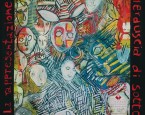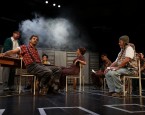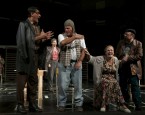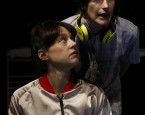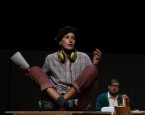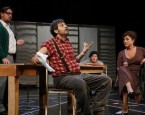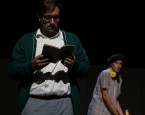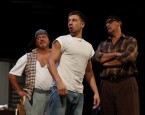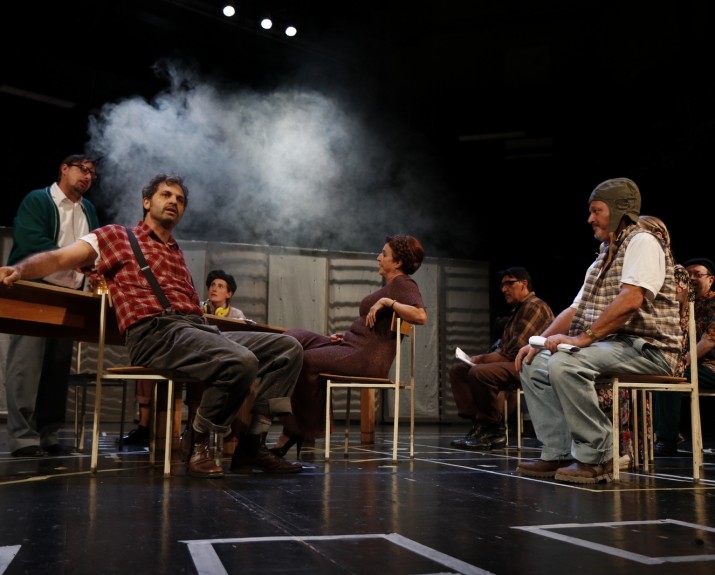
Premiere A PERFORMANCE OF HAMLET IN THE VILLAGE OF MRDUSA DONJA / LA RAPPRESENTAZIONE DELL’AMLETO NEL VILLAGGIO DI MERDUSCIA DI SOTTOIvo Brešan
Staging A Performance of Hamlet in Mrdusa Donja (La rappresentazione dell’Amleto nel villaggio di Merduscia di sotto), for the first time in Italian language, in the Istro-Venetian dialect to be precise, the Italian Drama Company wishes to honour the recently deceased author Ivo Brešan. His bitter comedy set in a rural context remains topical after 46 years since its opening night. This theatre classic is carried over into the present times by music and dance that enrich the dynamic direction and adaptation.
Running time:
The performance lasts 2 hours and 30 minutes.
There are timeless texts, authors who believe they are analysing a particular historical period, yet, they are hitting the target, namely, the cardinal issue of an epoch. Performance of Hamlet in the Village of Merduscia di Sotto/ La rappresentazione dell’Amleto nel villaggio di Merduscia di Sotto is one of those rare jewels that through satire and grotesque tragedy dissect problems and truths hidden by a group of people living in the hinterland of Dalmatia, yet, as shown by the Italian Drama performance, this could take place anywhere. Bitterness and injustice do not have an address, comedy and absurdity inhabit the world, while love is everywhere. Therefore, taking into account the universal potential of the text, the Italian Drama version our staging of the Performance moves into a place that is not geographically defined but characterized by the Istro-Venetian dialect and in the time present, where the villagers of Merduscia di Sotto struggle with democracy and multimedia globalization, which, in effect, offers an amplified mirror of that small rural community, as it originally had been. All changes and all remains the same. The Performance of Hamlet in the Village of Merduscia di Sotto commemorates the recently deceased Ivo Brešan, one of the most prominent Croatian dramaturges of nowadays. We believe that his words, for the first time translated into Istro-Venetian, will continue to make the spectators smile but also ponder.
Rosanna Bubola
Italian Drama Director
Dear spectator,
“What would happen nowadays?” was the question I asked myself having read Brešan’s text a few months ago. In fact, in the times when Brešan wrote it, it had to do with the world of nowadays. And what is the world like today? It is a composition of isolated pixels, all with the same characteristics, similarly to many of the Springfield citizens from The Simpsons. A place where the human has disappeared, the perspective being a boring game for the one who cannot enjoy the present life, the independence, that of the choice of opinion, a pest to run away from and to be treated.
I am convinced that a watchful and sincere representation of us, human beings, is possible only if we bear in mind that time is a relative category and space only a point of viewing phenomena through which our own being is articulated.
I am inviting you to enter Merduscia di Sotto with me and discover that the dialect spoken is not localisation but an instrument of a community that uses it to protect its own closed system within the global context. I would like to introduce you to its characters so that you, just as I have, could recognise in them your own self as well as people from your daily life.
In this way, Performance of Hamlet in the Village of Merduscia di Sotto/ La rappresentazione dell’Amleto nel villaggio di Merduscia di Sotto/ becomes a transposition in absolute and universal terms of ethical and cultural threats; before the actual politics, these are social crusts that block the authenticity of relationships. It is in this that the definition of the grotesque tragedy is realised, the author himself having wanted to put it next to the title, almost as an instruction for use.
The play examines the process of hyper-normalisation that each system generates and undergoes in its everyday and less apparent terms, frequently masked with innocence.
No one is innocent and all are (we included) agitated by a non-rationalised terror that pushes us, singing and dancing, to the edge of the abyss, while resistance is of no use.
More than ever I would like the theatre, as a stylized art, to tell a story that entertains but also torments with questions upon going to sleep, such as, What is justice? Is love still possible? Where is happiness? What is life? When will I have the strength to free myself?
lucacortina@me.com : Write to me in the morning about your dream.
Luca Cortina

